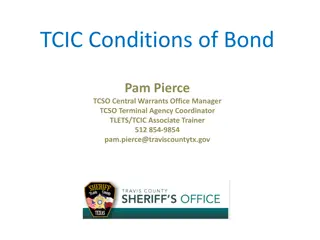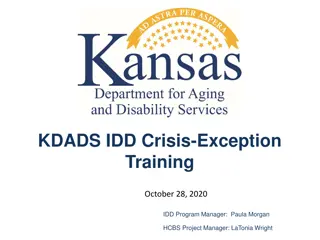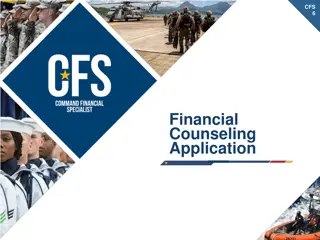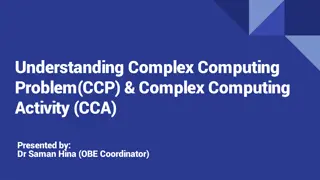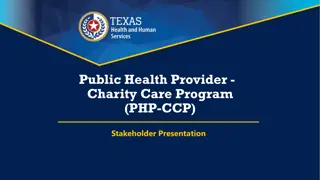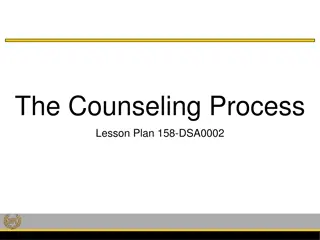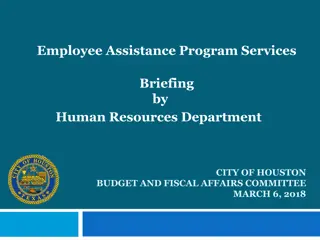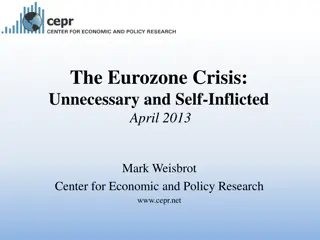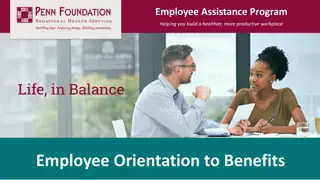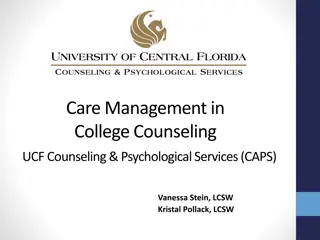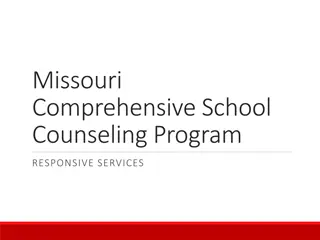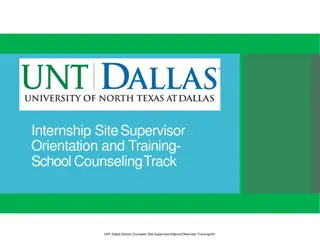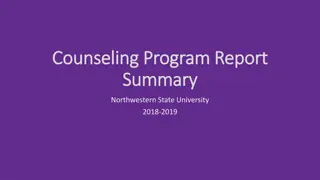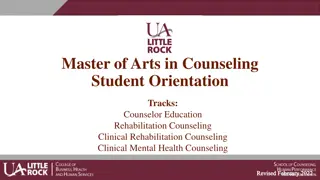Crisis Counseling Assistance and Training Program (CCP) Overview
The Crisis Counseling Assistance and Training Program (CCP) offers short-term disaster relief grants to states, U.S. territories, and federally recognized tribes. CCP grants support community-based outreach by training local individuals to provide services such as crisis counseling and emotional distress identification. The program provides two types of grants: Immediate Services Program (ISP) and Regular Services Program (RSP), each with specific timeframes and application requirements. CCP services include primary engagements like crisis counseling and supportive contacts, as well as secondary services focusing on broader outreach through educational materials and announcements.
Download Presentation

Please find below an Image/Link to download the presentation.
The content on the website is provided AS IS for your information and personal use only. It may not be sold, licensed, or shared on other websites without obtaining consent from the author. Download presentation by click this link. If you encounter any issues during the download, it is possible that the publisher has removed the file from their server.
E N D
Presentation Transcript
Crisis Counseling Assistance and Training Program (CCP): Delivering an Immediate Services Program (ISP) During a Social Distancing Event U.S. Department of Health and Human Services Substance Abuse and Mental Health Services Administration Disaster Technical Assistance Center April 1, 2020
Welcome Introduction to CCP Grants Immediate Services Program (ISP) Application Considerations During the COVID-19 Outbreak Helpful Resources Q&A
CCP Grants The CCP is a short-term disaster relief grant for states, U.S. territories, and federally recognized tribes. CCP grants may be awarded after Individual Assistance has been approved on a presidential major disaster declaration. CCP funding supports community-based outreach by training local individuals to conduct individual needs assessments that include the identification of serious emotional distress.
Types of CCP Grants The CCP provides funding through two grant programs: The Immediate Services Program (ISP) grant provides funding for up to 60 days after a presidential major disaster declaration including Individual Assistance. The application is due 14 days after the date that Individual Assistance is designated on the major declaration. The Regular Services Program (RSP) grant provides funding for up to 9 months after the notice of award. The application is due 60 days after the date that Individual Assistance is approved on the major disaster declaration.
Types of CCP Services Primary CCP Services These are typically higher in intensity since they involve personal engagement with individuals, families, or groups. Individual Crisis Counseling Brief Educational Supportive Contacts Group Crisis Counseling Public Education Meetings Assessment, Referral, and Resource Linkage Community Networking and Support
Types of CCP Services Secondary CCP Services Secondary CCP services have a broader reach with a focus on reaching as many people as possible. Development and Distribution of Educational Materials Media and Public Service Announcements
ISP Application Requirements A complete ISP application package includes the following: CCP ISP Grant Application SF-424: Application for Federal Assistance SF-424A: Budget Information for Non-Construction Programs SF-424B: Assurances for Non-Construction Programs Budget Worksheet
ISP Application Components The ISP application form includes the following sections: PART I: General Application Information PART II: Plan of Service / Needs Assessment PART III: Response Activities PART IV: Budget PART V: Assurances PART VI: Application Checklist
General Considerations During the COVID-19 Outbreak Follow local and state guidelines. Limit person-to-person contact, and follow stay at home or shelter in place directives. Remain flexible and plan to adjust service delivery as the situation evolves. Protect staff and provide them with self-care strategies. Familiarize program leadership with risk communication resources from the Centers for Disease Control and Prevention and SAMHSA.
Needs Assessment Considerations Consider the impact of the outbreak. Consider your available state resources and capacity for immediate response. Consider special needs populations, such as those at high risk of exposure, the disaster unemployed, and those out of school for more than 2 weeks.
Special Circumstances Considerations Consider the following stressors that may occur. Grief and loss, mass bereavement, fatality management Difficult decisions faced by the healthcare community Financial stress Discrimination Reduced natural social supports, including family, friends, religious, and other community interactions School and childcare closures Anxiety related to the unknown progress of COVID-19 Increased sense of hopelessness and possible suicidal ideation
Primary Service Delivery Considerations Consider the use of telephone, virtual, and social media outreach where possible. Consider establishing or expanding existing helplines. Consider establishing a generic, branded email address where the community could reach out for support. Consider hosting virtual support groups. Leverage virtual meeting and social media platforms.
Primary and Secondary Service Delivery Considerations Consider the creation of a website designed to serve as a hub of information on local and national resources. Produce print and electronic psychoeducational resources, and consider creative ways to distribute them. Establish a monitored email listserv or e-newsletter. Drop off, mail, or email materials and tip sheets: For healthcare providers and first responders at their places of work For clergy at their places of worship At funeral homes for staff and families At grocery stores/pharmacies and other essential workplaces For inclusion in takeout and delivery bags from retailers For local businesses to email to their remote workers In large print for at-risk older adults
Secondary Service Delivery Considerations Consider optimizing the use of social media. Establish a branded program presence on popular channels, such as Facebook, Twitter, Instagram, etc. Host webinars or information sessions for the community. Broadcast information about coping and stress management via Facebook Live or Instagram Stories.
CCP Promotion Considerations Consider a mix of traditional and creative promotion activities to maximize the reach of your resources. Create a website and leverage search engine optimization. Use search engine marketing or pay-per-click advertising to promote the program. Partner with local media outlets to promote available services. Use social media channels to promote services as well as deliver information. Reach out to agencies such as emergency management and unemployment, as well as schools and businesses and ask if they will provide links to the CCP website.
Partnership Considerations Consider quickly developing new program partnerships. Healthcare facilities, including those for at-risk older adults Schools and educational providers Businesses Banks and credit unions Consider sharing best practices on disaster behavioral health approaches to quarantine and isolation with public health professionals, long-term recovery committees, and emergency management agencies.
Staffing Considerations Consider the use of a combination of lay crisis counselors and professional credentialed staff. Consider using a mix of more specialist staff and fewer traditional crisis counselors, such as: Media or communication specialists, social media specialists, and creative specialists Helpline staff Web or technology specialists Child specialists Senior care specialists
Staffing Considerations Consider virtual training for staff using Skype or other online platforms. Consider ongoing staff care and management activities. Hold daily, beginning or end of shift, virtual meetings or conference calls. Establish weekly virtual meetings with all workers to touch base, share ideas, and virtually support one another by discussing stress coping techniques and self-care for CCP staff. Provide access to online trainings about self-care and stress management.
Data Collection and Evaluation Considerations Consider establishing a data collection workflow that allows remote staff to enter data and supervisors and team leaders to approve the data electronically rather than using paper-based forms. All COVID-19 related grantees are advised to utilize the most recent OMB approved CCP data collection forms (OMB No. 0930-0270; exp 7/31/2022). SAMHSA DTAC technical assistance specialists are available to provide support, consultation, and virtual training on the data collection tools and systems. Consider providing staff with guidance and training about how to apply the data collection tools to unique circumstances such as phone calls, virtual counseling sessions, or social media interactions.
Budget Considerations Follow your state requirements and consult CCP guidance documents to ensure you are using funds in allowable ways. Ensure that your needs assessment, staffing plan, plan of services, and budget are in alignment. Provide justification for everything you include in the ISP budget.
Budget Considerations Consider including the following items for staff and program management in your CCP budget request: Phones for all crisis counselors to be able to provide more phone counseling and complete data entry Laptops or tablets if virtual meetings, training, and crisis counseling is occurring
Budget Considerations Consider including additional supplies or subscriptions if warranted by your plan of services. Subscriptions for virtual meeting technology (Skype for Business, Zoom, GoToMeeting, WebEx, etc.) Constant Contact or other eblast service account Ad buys print, online, and video Virtual tools for sharing or collaborating on documents, such as Dropbox, Hightail, or Shutterstock Multimedia software for videos and materials development (e.g., Adobe Creative Suite)
Helpful CCP Resources Consider consulting the following resources while you prepare your application. Online CCP Toolkit CCP Guidance ISP Application Supplemental Instructions CCP Management Training Course www.samhsa.gov/dtac
Helpful SAMHSA Resources SAMHSA s Coronavirus (COVID-19) website provides the latest resources and guidance. The SAMHSA Disaster Distress Helpline is a toll-free national hotline (1-800-985-5990) and SMS (text TalkWithUs to 66746) service available to anyone in U.S. states and territories. Complements existing local, state, and national information and referral/crisis hotlines. Offers multilingual interpretation services in 100+ languages, as well as live 24/7 crisis counseling in Spanish via the hotline and SMS (text Hablanos to 66746). Provides support to people who are deaf and hard of hearing through TTY (1-800-846-8517), relay service, and text.
National Suicide Prevention Lifeline The National Suicide Prevention Lifeline provides free and confidential support for people in distress. It is available to people in suicidal crisis or emotional distress 24 hours a day, 7 days a week. English: 1-800-273-8255 (1-800-273-TALK) Spanish: 1-888-628-9454 Option for people who are deaf or hard of hearing: 1-800-799-4889
Q&A Submit questions for our federal panel in the chat. Those questions that cannot be addressed within the time limit will be addressed in writing after the webinar. For more information or technical assistance after the webinar, contact SAMHSA DTAC at Phone: 1-800-308-3515 (toll-free) Email: DTAC@samhsa.hhs.gov Web: www.samhsa.gov/dtac



